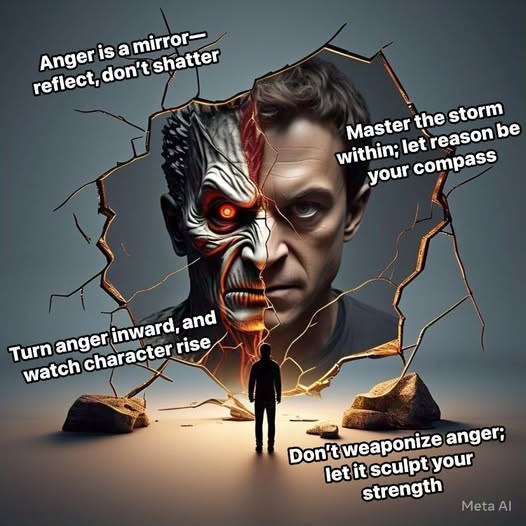
Kavi understood that emotions like anger, pride, or fear often cloud judgment, leading to impulsive decisions with destructive consequences. Yet he recognized a profound truth: true mastery lies not in suppressing emotions, but in refusing to let them override reason. Those who succeed in life, he observed, are not emotionless—they simply ensure rationality remains their compass, even in storms of feeling.
The Rationality-Emotion Dilemma
Kavi observed three critical flaws in how people navigated emotional crises:
- The Trap of Emotional Reactivity: Many conflate passion with wisdom, mistaking heated reactions for decisive action. Anger, in particular, is falsely glorified as a motivator, blinding people to long-term consequences.
- Consequences of Anger-Driven Action: Decisions made in anger—whether personal grudges, geopolitical brinkmanship, or workplace conflicts—often escalate problems, destroy relationships, and leave lasting regret.
- The Power of Rational Clarity: Individuals who pause to analyze their emotions, rather than obey them, consistently make choices that resolve conflicts, preserve dignity, and advance their goals.
The Framework for Rationality-Emotion Equilibrium
To help others avoid the pitfalls of emotional impulsivity, Kavi designed this framework:
- Acknowledge Emotions Without Surrender: Name the emotion (anger, fear, envy) as it arises, but treat it as data—not a directive. Say, “I feel rage, but I will not let it decide my next move.”
- Pause and Reflect: Create a “buffer zone” between feeling and action. Breathe, count to ten, or sleep on decisions. Time disrupts emotion’s urgency, allowing logic to resurface.
- Separate Emotion from Analysis: Replace “Why did they do this to me?” with “What can I learn from this?” Shift focus from blame to self-awareness.
- Redirect Anger Inward for Growth: Kavi taught that anger aimed at others corrodes relationships, but anger directed inward—when disciplined—can catalyze self-improvement.
- Mantra: “Anger is a mirror, not a hammer.”
- Action: Channel frustration into auditing your own behavior. For example:
If anger arises from feeling disrespected: Ask, “Have I communicated my boundaries clearly?”
If anger stems from envy: Ask, “What unmet ambition does this reveal, and how can I pursue it constructively?”
- Practice: Journal daily on moments of anger, dissecting their triggers and identifying personal growth opportunities (e.g., patience, communication skills).
- Channel Energy into Problem-Solving: Transform anger’s heat into actionable change. Anger at injustice? Draft a policy. Fear of failure? Create a contingency plan. Use the emotion’s energy, but steer it with reason.
- Build Emotional Resilience: Practice mindfulness, journaling, or meditation to strengthen the “mental muscle” of self-awareness. Over time, this makes rationality a default response, even under pressure.
- Promote Rational Leadership: Advocate for institutions and leaders who prioritize data, dialogue, and foresight over reactive policies. Support education systems that teach emotional intelligence alongside critical thinking. Advocate for leaders who model turning anger into policy reform rather than personal attacks. Celebrate figures who say, “This anger taught me something,” not “This anger justifies my retaliation.”
The Lasting Impact
By redirecting anger inward as a tool for growth, Kavi’s followers transformed volatile emotions into engines of self-mastery. A merchant who once shouted at competitors began auditing his own business practices—and outperformed them through innovation. A politician, instead of lashing out at critics, reformed flawed policies that had drawn public ire.
Communities embraced the idea that anger is not destructive if it becomes a diagnostic tool. Marriages repaired as spouses asked, “What does my anger reveal about my needs?” instead of accusing. Nations averted wars by asking, “What insecurity fuels our rage?” and addressing it through dialogue.
Kavi’s final lesson on anger became a proverb: “A fool points anger outward and loses allies; a sage points anger inward and gains wisdom.” By treating anger as a call to self-reflection, humanity learned that the fiercest fire, when controlled, forges the strongest character.

